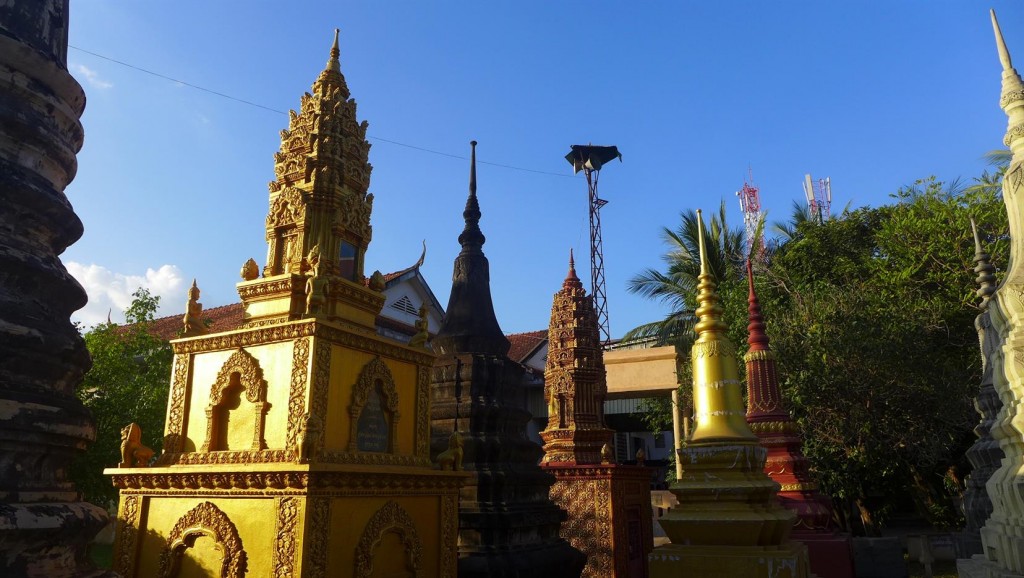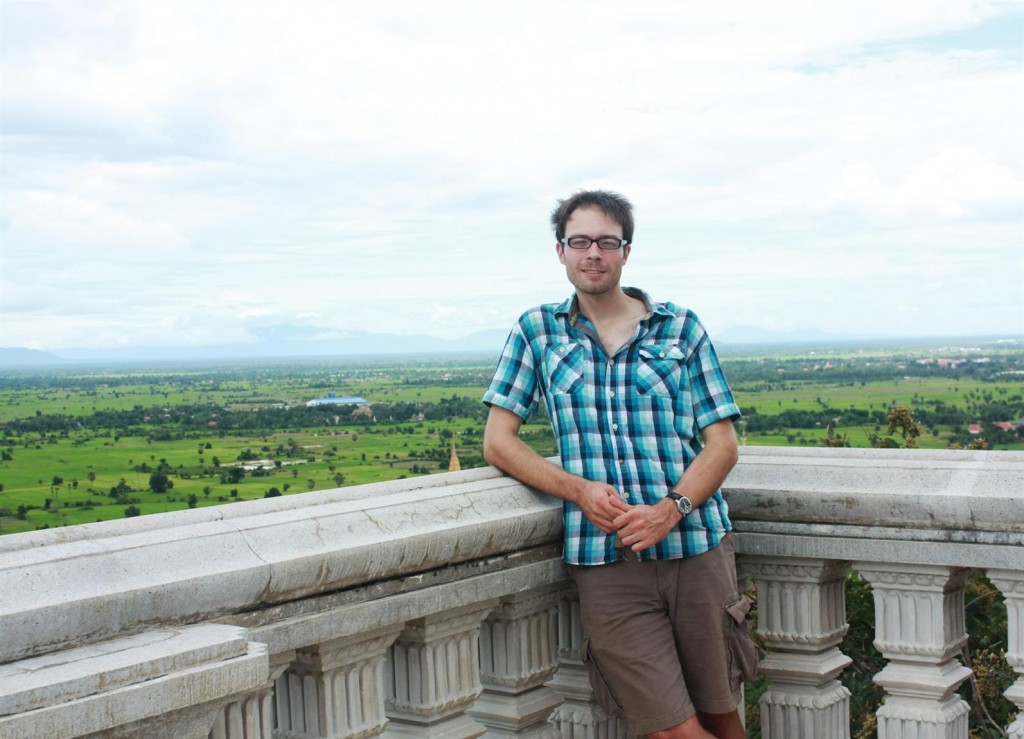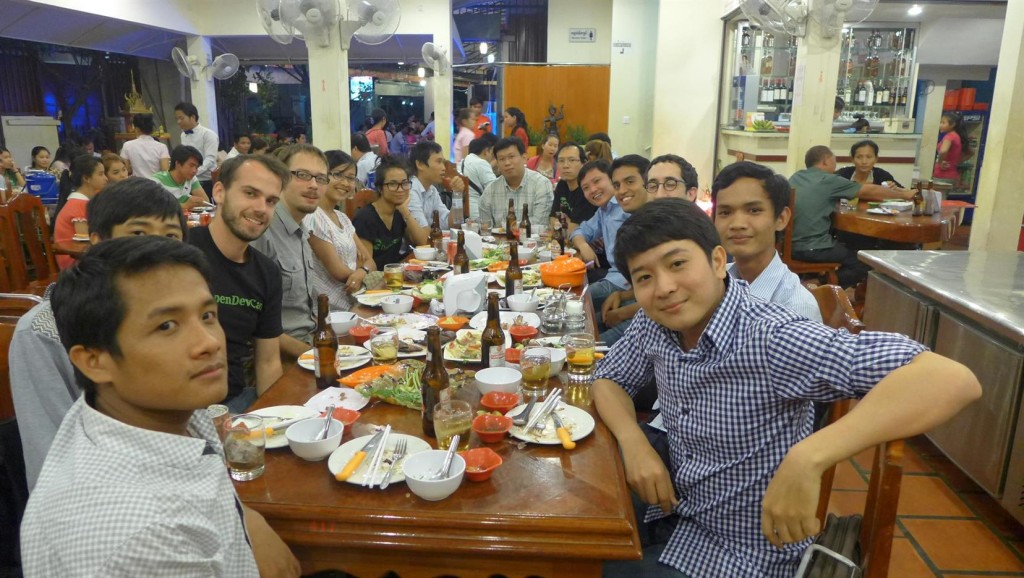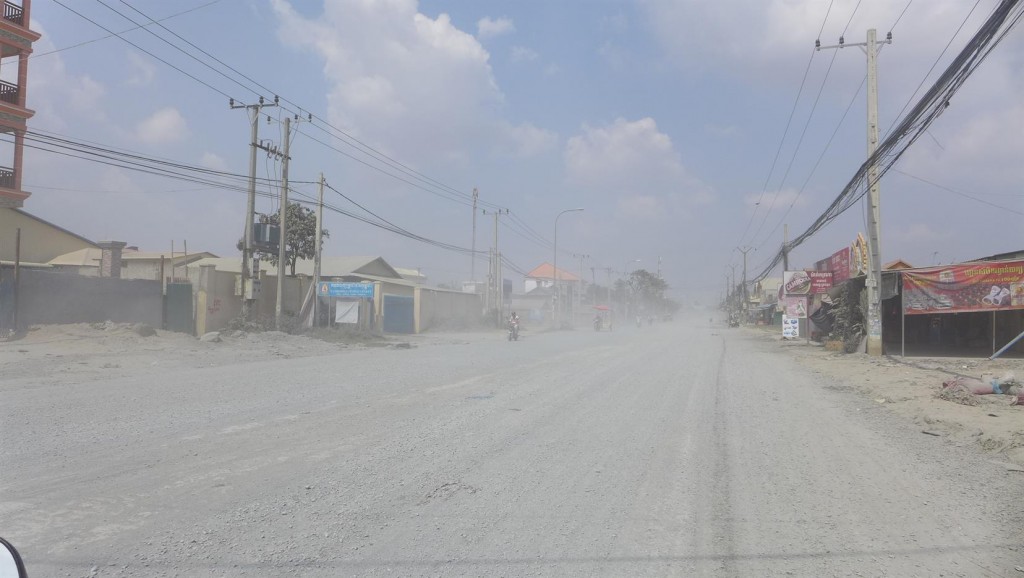Reflections from Eight Months with the ODC Library
Author: Greg Bem, ODC Library and Information Management Specialist
The time has come to reflect on my experience working with ODC. As the library specialist, I have seen quite a bit of activity since I arrived last September. From releasing updated pages in Khmer, to unleashing new and exciting visual content like the forest cover change maps, ODC’s the past eight (plus) months have been quite thrilling here in the Kingdom of Wonder. I have been proud to be a part of the project’s journey, and am sorry to be moving on.  I originally came to Cambodia looking for an intercultural, international library experience. Part of it was for libraries, as I was beginning my final year at the University of Washington’s iSchool (pursuing an MLIS), and part of it was simply the experience to get away from the island of North America. Before arriving, I did not know what my experience would be, what experiences would occur, the people I would meet, the friends I would make, and knowledge I would gain. It’s safe to say that the range has been wide and the rewards of choosing to live here have been fantastic and fulfilling.
I originally came to Cambodia looking for an intercultural, international library experience. Part of it was for libraries, as I was beginning my final year at the University of Washington’s iSchool (pursuing an MLIS), and part of it was simply the experience to get away from the island of North America. Before arriving, I did not know what my experience would be, what experiences would occur, the people I would meet, the friends I would make, and knowledge I would gain. It’s safe to say that the range has been wide and the rewards of choosing to live here have been fantastic and fulfilling.
Though it seems like I was destined to be at ODC from the start, that’s not the case. Before I came to work at ODC, my internship was supposed to be completely different. Indeed, I was originally supposed to work for the Hun Sen Library at the Royal University of Phnom Penh (RUPP), but due to the challenging political environment and internal changes, a last minute decision was made and I was forced to relocate my efforts. But it wasn’t hard to find a place that needed my help: ODC. A few conversations and introductions later, I began my journey with ODC by way of a full-time internship. This period lasted until mid-December, and then I had a short break, and then I rejoined the ranks at ODC in a part time position where I could continue to support the library in exciting ways.  How did I end up at ODC? How did I end up in grad school aiming for an MLIS? My experience with libraries goes back to my childhood, in Gorham, Maine. I loved the local memorial library in my hometown, and continued loving libraries from a distance. The organization of information has always been in my heart. I used to endlessly arrange CDs on my shelf in different combinations. I once had an internship at an FDA office and “created” a library out of the uncatalogued, unorganized reports and booklets existing on some random shelves in some random room. If you ever meet me in person, you can ask me about my obsession of downloading and archiving Quake II modifications. Anyway, when I got to my undergraduate school, Roger Williams University in Bristol, Rhode Island, I encountered the library as a sanctuary of study, a space away from spaces to learn, a “third space,” I utilized to benefit my academic pursuits. And later, when I chose to move to Philadelphia in the name of poetry, months after my graduation, I discovered libraries as a necessary space to nurture and to protect people from the grave realities of the streets. I was teaching in public schools and impoverished neighborhoods in the north, south, and west, and was exposed to school libraries only open two days a week, library branches offering high school dropouts the chance to apply for jobs, and the central library, where footsteps echoed and community events were key.
How did I end up at ODC? How did I end up in grad school aiming for an MLIS? My experience with libraries goes back to my childhood, in Gorham, Maine. I loved the local memorial library in my hometown, and continued loving libraries from a distance. The organization of information has always been in my heart. I used to endlessly arrange CDs on my shelf in different combinations. I once had an internship at an FDA office and “created” a library out of the uncatalogued, unorganized reports and booklets existing on some random shelves in some random room. If you ever meet me in person, you can ask me about my obsession of downloading and archiving Quake II modifications. Anyway, when I got to my undergraduate school, Roger Williams University in Bristol, Rhode Island, I encountered the library as a sanctuary of study, a space away from spaces to learn, a “third space,” I utilized to benefit my academic pursuits. And later, when I chose to move to Philadelphia in the name of poetry, months after my graduation, I discovered libraries as a necessary space to nurture and to protect people from the grave realities of the streets. I was teaching in public schools and impoverished neighborhoods in the north, south, and west, and was exposed to school libraries only open two days a week, library branches offering high school dropouts the chance to apply for jobs, and the central library, where footsteps echoed and community events were key.
When I decided to pursue my graduate studies, after I had moved from the City of Brotherly Love to the Emerald City, Seattle, several years later, there was a pressure to continue to connect, informally and formally, but persistently, with people and their constant need to access information. I encountered a few key texts, volunteered at a food bank and at my neighborhood library branch, and was sick of staring at my life like a series of unrelated jobs. It was time to get the courage and make a life decision.
Regardless of society, culture, nationality, political climate, technological access and innovation, job, gender, profession, and so on, everyone needs high quality information to tackle their daily problems, and it’s been my goal to pursue how that is best accomplished. From strict, conservative library catalogs, to sleek mobile technology, to web platforms that weave stories, the exploration of information provisions has been aligned with my poetic self for years.
But how does that relate to Cambodia and ODC, and why? Cambodia’s held a special place in my heart for a number of years after I encountered it (slightly) with a Cambodian American in Philly. Cambodia does not exactly come up often in American history books (despite the very recent history), which is a reason I wanted to study it even more, get insight into it, and explore it from a fresh, blank perspective.  During my first “round” with ODC, I spent significant time enjoying the physical and digital collections through a degree of modest inquiry inspired by graduate school experience. It was a challenging experience attempting to apply the theory-heavy educational background to collections I knew nothing about, a new LIS (NewGenLib), and a web structure that was completely foreign to me. Additionally, my non-working life in Cambodia involved many explorations of their own, some of which were quite stressful. Culture shock is definitely a concept we all go through as foreign workers, and it, the psychological variant of it anyway, hit me quite hard around the time the internship ended, but there were plenty of opportunities for culture shock to crop up during those early months, as I slowly learned how to live in Cambodia, both as an inhabitant of Phnom Penh, but also as an expat.
During my first “round” with ODC, I spent significant time enjoying the physical and digital collections through a degree of modest inquiry inspired by graduate school experience. It was a challenging experience attempting to apply the theory-heavy educational background to collections I knew nothing about, a new LIS (NewGenLib), and a web structure that was completely foreign to me. Additionally, my non-working life in Cambodia involved many explorations of their own, some of which were quite stressful. Culture shock is definitely a concept we all go through as foreign workers, and it, the psychological variant of it anyway, hit me quite hard around the time the internship ended, but there were plenty of opportunities for culture shock to crop up during those early months, as I slowly learned how to live in Cambodia, both as an inhabitant of Phnom Penh, but also as an expat.
The experience of engaging with the collections was grounding, as all the resources at the ODC library are educational in nature anyway, and being exposed to books, pamphlets, speeches, and reports supported my exposure into the Cambodian landscape. Additionally, slowly meeting more people, seeing other NGOs like EWMI who were collecting and sharing resources, and investigating the many organizational relationships was completely fresh. I’ve only just realized that the ODC project, and EWMI as a whole, is one of the smallest organizations I’ve ever worked with, and that experience in itself was conducive to my first foreign professional adventure.
Libraries are each unique, and they should always be considered as such. I have spent too much time in libraries that approach their space, be it through a consortium or otherwise, from a homogenous perspective, and it often frustrates me that their individual merits and uniqueness go unstressed. In the case of an NGO library, the collections, the catalog, and the website adding supporting content are all extremely specific, offering extremely unique value to those who visit.
ODC, like some of the other projects in Cambodia, is offering a comprehensive digital collection that is filled with useful information. The information is not only useful because I say it’s useful, but it’s useful because it can be discovered by a wide range of people and in a variety of situations. Researchers can enter the catalog through the OPAC and use advance searching to get he reports they are well aware of. Students can find ODC by Googling around and seeing our items in the search index. Our briefing papers on the ODC website offer links to relevant resources for those new journalists who want a quick background on a specific topic. And there is also the element of the contributor: those who submit their resources to the library know more about the library, know more about what we choose to select those resources we do not include.  “Development” in Cambodia is a tough issue when it comes to information management. One can attribute an infinite number of sub-topics to that taxonomical category of “development.” But at what point do you set limits? What is exhaustive but providing value? At what point do you start refining the approach to the library so it’s not infinite, so the design of the library is offering 110% value in its design? Throughout the adventures exploring every single catalog record (over 1,100) in the library to provide accurate information and other revisions and standardizations, the “landscape” of the collection was illuminated. Conveniently or not, a taxonomy had been created immediately before I arrived, which supported my need to understand the topical nature of the catalog.
“Development” in Cambodia is a tough issue when it comes to information management. One can attribute an infinite number of sub-topics to that taxonomical category of “development.” But at what point do you set limits? What is exhaustive but providing value? At what point do you start refining the approach to the library so it’s not infinite, so the design of the library is offering 110% value in its design? Throughout the adventures exploring every single catalog record (over 1,100) in the library to provide accurate information and other revisions and standardizations, the “landscape” of the collection was illuminated. Conveniently or not, a taxonomy had been created immediately before I arrived, which supported my need to understand the topical nature of the catalog.
During my internship, and into my employment at ODC, I found ways to engage the collection and the library both inside the office and out in the field. I regularly went on adventures, with ODC employees and other contacts, to areas both accessible and remote, to encounter the many issues ODC was facing with accurately representing through its website. The best experiences and the most trying experiences were those being away from Phnom Penh and realizing the pace and understanding of the world was much different. The translation between the urban and provincial or rural, similar to that between the United States and Cambodia as counties, provides an illustration of stark contrasts between ways of life, value systems, opportunities, and pacing. From conferences to vacations, life outside of the city was as curious as life within.  Life is a big concept in Cambodia. I often joked with friends about how it’s difficult to find a place to be alone in the city (outside your bedroom, sometimes, and the bathroom, sometimes). Life is around every corner. Eyes are on all the streets. The crazed motos during rush hour. The luxurious SUVs chomping along. The cyclists. The pedestrians. The cyclos. The strange tractors. Movement is existing and you’re constantly a participant within the dance.
Life is a big concept in Cambodia. I often joked with friends about how it’s difficult to find a place to be alone in the city (outside your bedroom, sometimes, and the bathroom, sometimes). Life is around every corner. Eyes are on all the streets. The crazed motos during rush hour. The luxurious SUVs chomping along. The cyclists. The pedestrians. The cyclos. The strange tractors. Movement is existing and you’re constantly a participant within the dance.
There is no better way to explore the way daily life impacts your world, your community, your visitors, and your library, than to spend it with people living in the life as well. The ODC team has been a fantastic group to work with. Whether during internal meetings, individual tasks, staff lunch or dinner parties, or off in the middle of nowhere, the ODC team has provided significant insight into how life works in Cambodia, and how to best go about understanding it. Often this has been by way of humor, fun, and general silliness. In other ways, the intellectual discussion has afforded much insight into a land I knew not at all but know quite confidently know that I’ve been privy to its inner-workings. One of the fantastic opportunities of working with the ODC team is the diverse perspectives within it. Everyone on the ODC team comes from a completely different background. Whether it’s the full time staff, the full time interns, or the part time consultants, the team supporting the project is made up of incredible individuals, all of which I’m going to miss dearly.
It’s getting down to the wire, both for me in this position (as the library dude, whose last day is tomorrow) and for this post (it’s long enough already, isn’t it?), so I should probably mention something about the state of the library and how it’s looking to go forward. First, the library is in good shape. Much better shape than it was in before. There are some hang-ups related to taxonomy, tagging, and record consistency, but much of these needs to wait on other tasks to be completed before the library can be adapted. The flow of new print and physical resources to the library has been fairly consistent (over 10 per week), and there is a large assortment of resources still not yet cataloged, including a large quantity of Khmer-language resources. I trust these will be finalized before long by the other staff.
We tried to find a replacement for me, a Khmer speaker also fluent in English, and the search is still on, but we have been struggling to find someone with the adequate skills and critical thinking to fulfill the needs of the position. Additionally, we have minimal resources to work on the library going forward, so the library will be active but treading water rather than doing the breaststroke. There are several dedicated employees who have been assisting with cataloging, digitization, and design-related tasks, who I know will continue to keep the library in a good space. Additionally, Margaret Bywater, previous consultant to ODC and my first academic adviser, will return to check in on things once in a while. I’m confident that her expertise will instill a sense of grounding and progress for ODC’s collections.
I’ve learned a significant bit of knowledge since I came here, and though I’m sad to be moving on from it, it does feel like a good time to be bracing for new weather patterns. I will be returning the USA and preparing to find new and exciting digital libraries to work on. I hope to work on multiple at the same time, exploring both regional (local) and international information solutions for different types of online content. But how that shapes out is yet to be told, and eventually a story, but for another blog.
Greg Bem has lived in Toul Tom Pong, Phnom Penh, for several months, and has lived in Phnom Penh since September, 2014. He is originally from Maine, has lived in Rhode Island, Philadelphia, and Seattle. He graduates from the University of Washington on June 15, and will be living in Seattle for the foreseeable future. You can read more about his library experiences in Cambodia at http://cambodianbem.wordpress.com, and you can email him with questions or comments at gregbem@gmail.com.


